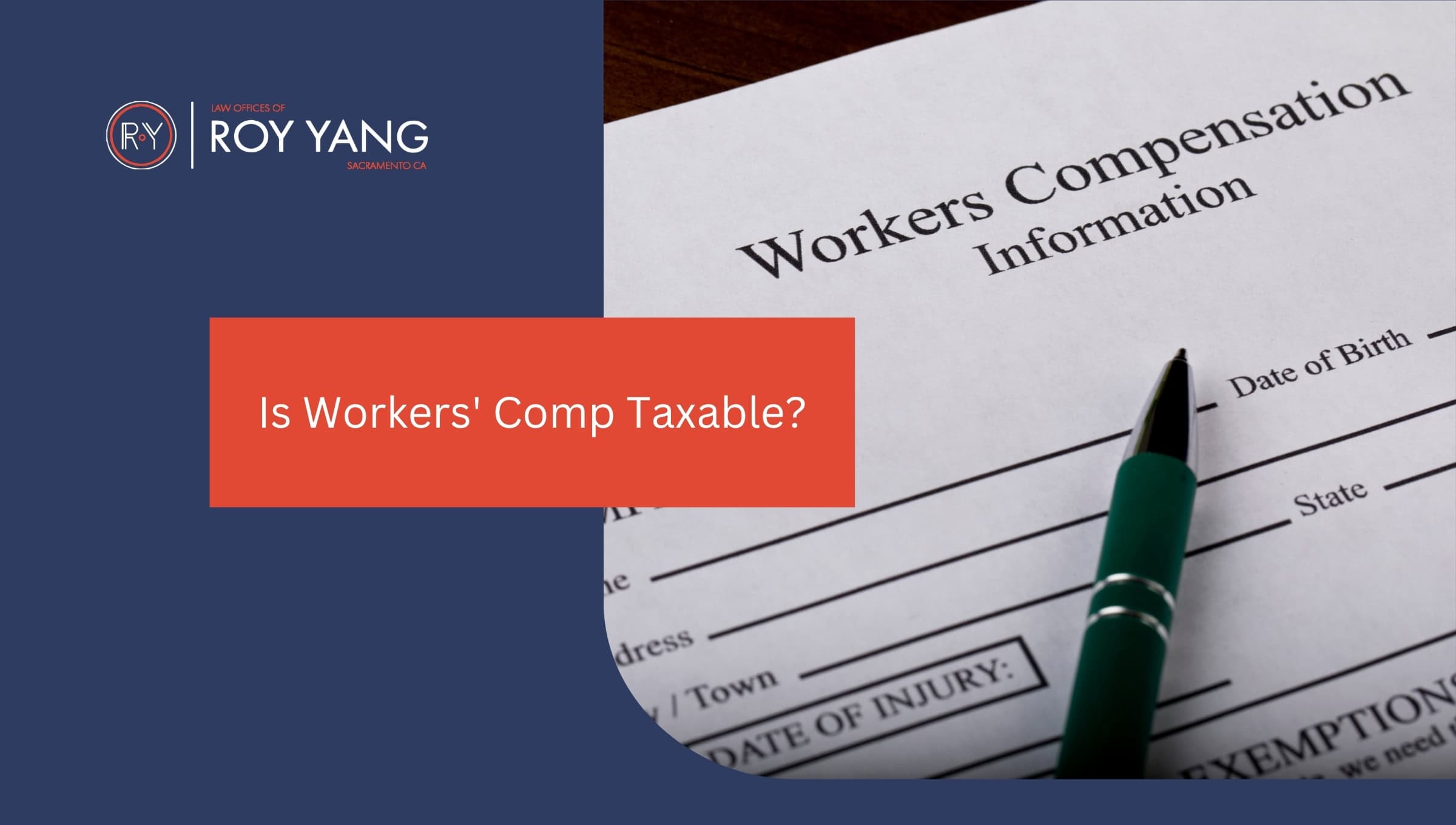In most cases, no, but certain exceptions apply that every injured worker should understand.
The good news is that under both federal and California state law, workers’ comp benefits are typically not considered taxable income.
This includes payments for medical expenses, lost wages, and vocational rehabilitation.
But like many legal matters, the answer isn’t always black and white.
There are exceptions, especially when workers’ compensation overlaps with other government benefits such as Social Security Disability Insurance (SSDI) or Supplemental Security Income (SSI). In those cases, a portion of your benefits may become taxable due to what’s known as the workers’ compensation offset rule under federal tax code.
For injured workers already facing physical, emotional, and financial stress, the last thing they need is a surprise tax bill. That’s why it’s essential to get clarity on Is Workers’ Comp Taxable? early, well before filing season arrives.
Key Takeaways
- Workers’ compensation benefits are not taxable under both federal law and the state of California.
- Workers’ compensation payments are not taxable in the state of California, as they are treated as compensation for injury, not earned income.
- Workers’ compensation benefits are generally not taxable, including medical care, rehabilitation costs, and temporary disability payments.
- Workers’ comp is not taxable unless the benefits overlap with Social Security Disability (SSDI) or include taxable wage replacements or interest.
- Workers’ compensation benefits that you receive are not taxable, but lump-sum settlements should be reviewed for potential taxable portions.
- Legal and tax guidance is essential – an experienced workers’ comp lawyer at the Law Office of Roy Yang helps clarify benefit classification and ensures compliance with California tax laws.
Workers’ Comp and Taxes: What Every Injured Worker Needs to Know
If you’ve been injured on the job, workers’ compensation can be a financial lifeline. But when tax season approaches, many injured employees are left wondering how these benefits are treated under the law. This section breaks down how workers’ comp is structured and why its tax status is different from regular income, so you can avoid surprises and protect what you’ve rightfully earned.
What is Workers' Comp and Why It Matters for Your Taxes?
Workers’ compensation is a state-mandated insurance program that provides medical coverage and wage replacement to employees suffering from work-related injuries or occupational illnesses.
Under both Internal Revenue Code §104(a) and the California Revenue and Taxation Code, workers’ comp benefits are generally classified as non-taxable income. This means you typically don’t need to report them on your federal or state tax returns. However, if your benefits are offset by other taxable income, such as Social Security Disability Insurance (SSDI), a portion may become subject to federal taxation.
For injured workers already dealing with pain, recovery, and financial stress, the threat of unexpected taxes can be overwhelming. Knowing your rights, and speaking with a qualified legal or tax professional can help you protect your compensation and avoid costly surprises.
How Workers' Comp Differs from Regular Income for Tax Purposes
Workers’ compensation is not classified as earned income under federal tax law. IRC §104(a) exempts these benefits from taxation, recognizing them as compensation for work-related harm, not earned income. In contrast, regular wages are taxable income under IRS rules, representing compensation for labor or services performed.
For injured workers, this distinction is critical. While regular income is subject to income tax, Social Security tax, and Medicare tax, workers’ comp offers financial relief without additional tax burdens, unless offset by other taxable benefits like SSDI. Knowing the difference helps injured employees avoid filing mistakes and unexpected liabilities.
| Category | Workers' Comp | Regular Income |
|---|---|---|
| Purpose | Compensation for injury or illness | Payment for hours worked |
| Taxable by IRS | Non-taxable (per IRC §104[a]) | Taxable under IRS and state law |
| Who pays? | Employer (via workers' comp insurance carrier) | Employer directly |
Real-World Examples of Taxable Substitution
Taxable Substitution typically arises in rare cases where a workers’ comp settlement includes elements like interest on delayed payments, penalties, or wage replacement. For example, if you receive $40,000 for medical treatment (non-taxable) and an additional $3,000 in interest, that interest is considered taxable, even though it’s part of your overall compensation package.
Before signing any settlement agreement, it’s crucial to consult a workers’ compensation attorney or qualified tax advisor. They can help ensure each part of your settlement is accurately labeled and legally sound, so you keep what you rightfully earned without facing avoidable tax consequences.
Why Workers' Comp Benefits Are Usually Not Taxable?
Workers’ comp is usually not subject to income taxes because it is a form of compensation for lost wages and medical expenses rather than regular income. The law applies depending on both federal and state-level rules.
Federal Rules on Workers' Comp and Taxability
Under IRS Publication 907 and Internal Revenue Code §104(a)(1), workers’ compensation benefits received for a job-related injury or illness are excluded from gross income. This means you do not have to report them on your federal tax return unless the benefits are partially offset by taxable programs, such as Social Security Disability Insurance (SSDI).
California State Laws on Workers' Comp Tax Treatment
The California Franchise Tax Board (FTB) aligns with federal guidelines, stating that workers’ compensation benefits are fully exempt from state income tax, including temporary disability, permanent disability, and medical reimbursements. Whether you live in Los Angeles, Sacramento, San Diego, or anywhere else in California, the state ensures these benefits are tax-free, helping injured workers avoid unnecessary financial strain while they heal.elping injured workers avoid unnecessary financial strain while they heal.

When Workers' Comp Becomes Taxable: Key Exceptions
While workers’ comp is usually tax-free, certain exceptions exist. A key exception is receiving Social Security Disability Insurance (SSDI) at the same time.
How SSDI Affects the Taxability of Workers' Comp Benefits
If you’re receiving both Social Security Disability Insurance (SSDI) and workers’ compensation, part of your SSDI could become taxable, even though your workers’ comp remains tax-free. This happens due to the workers’ compensation offset, a rule under the Social Security Act that applies in California and most other states.
Under federal law, if your combined monthly SSDI and workers’ comp payments exceed 80% of your average pre-injury earnings, the Social Security Administration (SSA) will reduce your SSDI benefits. That reduced amount; known as the offset, is considered taxable income and must be reported on your federal tax return.
Your workers’ compensation benefits, however, are still fully exempt from tax under IRC §104(a)(1) and California tax code. But for someone already coping with physical recovery, emotional stress, and financial uncertainty, learning that your SSDI offset is taxable can feel overwhelming and unfair.
Workers' Comp Settlements: Lump Sum, Structured Payments, and Taxes
When your case settles, compensation may come in two forms: a lump sum settlement or structured payments over time. Both can bring much-needed relief-but how these payments are labeled and allocated can affect their tax treatment under federal law.
- Lump Sum Settlement: A one-time payment intended to close the case entirely.
Example: $50,000 paid upfront to cover future medical expenses or lost wages. - Structured Settlement: A series of regular payments over a defined period.
Example: $2,000 per month for 24 months.
If any portion of your settlement is allocated as wage replacement, the IRS may view that portion as taxable income. This can happen when a settlement includes back pay or lost earnings not clearly categorized as compensation for physical injury or medical care.That’s why it’s essential to carefully review the terms of your settlement agreement, especially how the funds are itemized. A single misclassification can create unforeseen tax consequences.
Where to Report Workers' Comp or Settlements on Your Tax Return
If a portion of your benefits, such as an SSDI offset is deemed taxable under federal law, it must be accurately reported to the IRS to avoid penalties or delays in processing your return.
Taxable amounts are typically reported on Form 1040, and may also appear on Form SSA-1099 if related to Social Security Disability Insurance. You can file using IRS Free File, reputable tax preparation software, or through a qualified tax professional.

How to Avoid Tax Surprises in Workers’ Comp Settlements?
Certain legal oversights can result in unintended tax consequences, especially when your benefits intersect with other programs like Social Security Disability Insurance (SSDI).
To protect your compensation and avoid costly mistakes:
- Understand how workers’ comp interacts with other taxable benefits, including SSDI and SSI.
- Carefully review your settlement agreement, particularly how funds are allocated (e.g., wage replacement vs. medical care).
- Consult a workers’ compensation attorney or tax advisor before signing any settlement documents to ensure your rights and your income are fully protected.
Even small details can have a big financial impact. Take the time to get the right legal guidance, so your settlement truly supports your recovery.
How Workers’ Comp Affects Other Benefits (SSDI, Medicare, UI)
After a serious injury, navigating the overlap between workers’ compensation and other government benefits can feel overwhelming. Each program, whether it’s Social Security Disability Insurance (SSDI), Medicare, or Unemployment Insurance (UI), has its own legal requirements, and receiving workers’ comp may affect your eligibility, benefit amount, or timing.
- SSDI (Social Security Disability Insurance): Your monthly SSDI benefits may be reduced under the workers’ compensation offset rule. This applies if the total of your SSDI and workers’ comp exceeds 80% of your average current earnings, as calculated by the Social Security Administration.
- Medicare: While workers’ compensation does not affect your Medicare eligibility, certain settlements may require you to establish a Medicare Set-Aside (MSA). This is a legal arrangement that ensures future medical costs related to your work injury are paid from your settlement before Medicare provides coverage.
- Unemployment Insurance (UI): In most cases, you cannot collect both workers’ comp and UI simultaneously. UI requires you to be medically able and available to work, which contradicts the injury-based eligibility for workers’ comp.
These rules can be confusing, and mistakes can lead to benefit delays, reductions, or work comp denials. If you’re receiving multiple forms of support, it’s important to consult a workers’ compensation attorney or benefits specialist to ensure you’re maximizing your entitlements and staying compliant with program rules.
How the IRS Handles Workers’ Compensation Cases
The IRS generally doesn’t tax workers’ compensation benefits, but it does scrutinize certain portions of a settlement, particularly those that may substitute for taxable income. Its role is to determine whether any part of your settlement, such as back wages or interest payments, should be classified as taxable under federal law.
If any portion of your benefits is taxable, here’s how to file it on Form 1040:
- SSDI Offset:
Use Form SSA-1099 (Box 5) to report total SSDI benefits- Line 6a = Total benefits
- Line 6b = Taxable portion
- Back Wages or Wage Substitution: May be reported on a W-2 (Box 1)
- Form 1040, Line 1 (Wages)
- Interest on Delayed Payments: Report as interest income on Schedule B (Form 1040)
Given the complexity of tax law and the risk of misclassification, we strongly recommend consulting a tax advisor or a workers’ compensation attorney. Their guidance can ensure you stay compliant, avoid audits, and protect the compensation you’ve worked hard to secure.
Why Legal Help Matters in Workers’ Comp Tax Questions
A workers’ comp lawyer identifies taxable portions of your settlement and ensures proper reporting. The lawyer reviews your benefits, flags IRS concerns, and coordinates with CPAs to prevent filing mistakes and penalties.

How a Lawyer Prevents Costly Tax Errors
Legal help is a must when workers’ comp benefits and taxes intersect. Misunderstanding tax rules can lead to penalties or lost benefits. You may require a workers’ comp lawyer to guide you through.
When to Talk to a Tax Attorney
If your case involves complex tax issues beyond negotiation (like reporting, audits, or IRS disputes), a tax attorney is better equipped to guide you. Signs it’s time to talk to a tax attorney:
- You received an IRS notice related to your workers’ comp or SSDI.
- Your lump-sum settlement includes interest or wage-related compensation.
- You’re unsure how to report SSDI offsets on your tax return.
Frequently Asked Questions: Workers' Comp and Taxes
Do I need to report workers’ comp on my tax return?
No, you do not need to report workers’ compensation on your tax return unless there are exceptions, such as SSDI offsets or taxable substitutions.
Are medical benefits from workers’ compensation taxable?
No, medical benefits do not count as income and are therefore untaxable under workers’ compensation.
Does returning to work while on workers’ comp change my tax status?
Yes. Any wages earned after returning to work are taxable, just like regular income. However, your workers’ compensation benefits remain non-taxable, as long as they’re for your injury or illness.
Can receiving workers’ comp affect my Social Security Disability taxation?
Yes, it can. If you receive both workers’ comp and SSDI, and their combined monthly total exceeds 80% of your average pre-disability income, part of your SSDI benefits becomes taxable.
Will my workers’ comp settlement be taxed if I receive a lump sum?
No, lump sum workers’ comp settlements are generally not taxable. However, if any part covers interest, back wages, or other taxable items, that portion may be subject to tax.
Should I settle my workers' comp case if I'm worried about taxes?
It depends. Most settlements aren’t taxable, but certain components, such as interest or wage replacement, may be. To avoid surprises, consult a workers’ comp attorney or tax advisor before settling.
Get Legal Advice About Your Workers' Comp Case
Navigating a workers’ compensation claim can be emotionally and financially exhausting, especially when complex issues like SSDI offsets, taxable substitutions, or IRS reporting obligations come into play. Even small missteps in how your settlement is structured or reported can lead to unexpected tax liabilities or reduced benefits down the line.
You don’t have to face this alone.
If you’re a California worker feeling overwhelmed or unsure about your rights, the Law Offices of Roy Yang is here to help. We understand the nuances of California workers’ compensation law, federal tax implications, and how to protect your full entitlement. Our legal team will handle the paperwork, legal analysis, and negotiations, so you can focus on healing.
Contact us today for trusted legal advice, personal support, and the experienced representation your case truly deserves.



